I saw a lot of questions here but no one fits with my problem. I'm trying to create an ER model scalable, and if I want to add more data don't break almost anything, so what I've trying to create is :
There are 2 types of users, let's say Admin and Worker, and they have different roles.
Admin can do a CRUD of questions, and also can create a room where the users can join to play together (this is just a name, something like Kahoot! does) but maybe is a good idea to create more attributes inside of it like, WHO is playing in this room, POINTS for everyone but let's talk it afterwards when I show you the design.
Ok the thing is, on my design I have :
Table User which contains :
_id
username
password
date_creation
This is a default one, but then I'm wondering how do I define the Role if it's an Admin or a Worker, something like isAdmin:true and then I check this Bool? Or I can create another table that is Role and connect it to User table?
But maybe I have to create a table for both, I mean there's an Admin which has a password, and some functionalities and then ther'es the user Worker which has another password and another functionalities.
Then I'd like to have the Question table where contains :
_id
question_name
answers[1,2,3,4]
correctAnswer or answers because it can be multi option chooser
topic
isExamQuestion
dificulty
Then the Room table should contains :
_id
name
capacity
type (game can be as a group or solo) that's why this attribute
exam (This should be a flag to know if this question is for an exam or not (It can be for EXAM or PRACTISE)
ranking (This is the top X from 1 to X)
don't think if I have to add the winner here because if I get the position 0 from ranking I get the winner...
There's a table named Topic as well, if my question have a topic then I can select the question by Topic. An example of Topic should be Math so user can do only exams or do tests with math questions.
_id
Name
Questions[...]
Then I have to store like a historic about what are the questions worker has answered correct and what did not, to make some statistics, but I need to store some historicals for Admin to see in this topic the average that Workers have failed more is : Question23 (for instance) something like that.
What I'm missing, could you try to help me to figure it out how to make this design better?
NOTE : I'm using Spring for server side, Angular for Frontend stuff, and Android for App, I can change anything to work faster/better with this database though.
EDIT
There's the flow of the game if you need more details and if I'm explainted wrong .
Admin flow
- Create questions (with different kinds of answers like True/false, with a checkbos (single and multianswer), text, etc...)
- Create a "game" where workers can join (This is mostly programming stuff) but it should be a room with attributes there, like id of the room, maxNumber, type (exam), and store historicals, theres also a type of game (for instance, images, videos, etc..)
- See statistics about Workers it means see how many answers they answered correct, failed, see per topic (This is like joins and stuff, but the design has to be good done)
- See historic of the exams that he did before with all of the information (participant, score, time, stuff)
And the Worker flow is
He can practise means that he's answering questions randomly or by topic (every single answer should be saved for statistics and to avoid repeat the ones he respons correct), also he can do exams (not multiplayer) just an option that Admin can check if the question is part of an exam or not.
And then the room stuff, he can join with the Id.
If you need further clarification let me know and I'll reply you as soon as possible.
